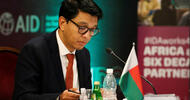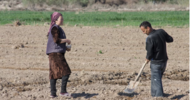Thousands of Ethiopians are being driven off their ancestral land that the government's selling without their consent to foreign investors buying up vast swathes of farmland, a U.S. watchdog reports.
Thousands of Ethiopians are being relocated or have already fled as their land is sold off to foreign investors without their consent.
- Guardian
-
07 February 2013
Indian companies that have invested in agriculture in Ethiopia are under fire from civil society groups. The companies have been accused of large-scale land grabbing, which has led to displacement of the tribal population there.
- Business Standard
-
06 February 2013
Indigenous Ethiopians demand a stop to human rights abuses stemming from agricultural investment policies
- Oakland Institute
-
05 February 2013
Faced with reports of land grabbing by Indian companies in some African countries, especially Ethiopia, the government says the Indian companies have taken land on lease as per rules of the country concerned.
- The Hindu
-
31 January 2013
A slew of countries and investors — from Chinese state corporations to Gulf sheiks to Wall Street firms — have started buying up farmland overseas, in an apparent attempt to acquire as much precious soil and water as possible.
- Washington Post
-
26 January 2013
A 'villagisation' programme that has been linked to the leasing of large tracts of land for commercial agriculture has left people from Ethiopia's Gambella region bereft of land and loved ones, casting donor support in an unflattering light
Rulli and colleagues estimate that global land grabbing is associated with the grabbing of 308 billion m3 of green water (i.e. rain water) and an additional grabbing of blue water that can range from 11 billion m3 (current irrigation practices) to 146 billion m3 (maximal irrigation) per year. To put these numbers in perspective, the average daily household consumption of water in the UK is 150 liters (0.15 m3) per person.
- 3quarksdaily
-
07 January 2013
Sudan launched a major dam project on Tuesday to boost power supply and agricultural irrigation, a plan officials hope will foster farmland exports and attract more Gulf investment to the African country as it battles an economic crisis.
- Kuwait Times
-
03 January 2013
As land and water become scarce, as the earth’s temperature rises, and as world food security deteriorates, a dangerous geopolitics of food scarcity is emerging, writes Lester Brown
- The Futurist
-
03 January 2013
Wealthy Gulf Arab companies are boosting their investment in Africa's vast lands and untapped resources, marking a shift for investors who have traditionally directed their money towards assets in the United States and Europe.
This article calls into question the depth and effectiveness of a regulatory approach arguing that problems underlying large-scale land deals are so deep constituting socio-institutional problems of power asymmetry, exclusion and invisiblization, than just investment externalities or regulatory challenges.
The Ministry of Agriculture is working on a draft bill for the formation of an autonomous federal agency, which would administer land available for agricultural investment in Ethiopia.
- Addis Fortune
-
30 December 2012
According to the data presented by international non-profit Rights and Resource Initiative, Indian companies have acquired 63,000 sq km land, an area almost twice the size of Kerala, in Africa, South America and Southeast Asia.
- Down to Earth
-
29 December 2012
"Large scale agriculture investment requires a lot of transparency and legal certainty, and that is what is lacking most of the time," he says. "We have seen that large-scale investment coming - I'm not saying that it is wrong, but it should be very clearly covered by countries' legislation.
- This is Africa
-
20 December 2012
This piece is part of "Water Grabbers: A Global Rush on Freshwater", a special National Geographic News series on how grabbing land—and water—from poor people, desperate governments, and future generations threatens global food security, environmental sustainability, and local cultures.
- National Geographic
-
14 December 2012
Mercy Corps, a non-governmental aid agency, plans to set up a $10 million private equity fund in Ethiopia to encourage foreign investment, primarily in agriculture.
- Bloomberg
-
11 December 2012
Controversial farmland deals in developing countries can have a negative impact on the people who live on the land, according to a new U.N. report.
Major farmland investors such as banks and pension funds must stop facilitating land grabs, civil society groups on the eve of a global farmland investment conference in London on December 3-5, have said.
- AkanimoReports
-
30 November 2012
A new study puts "land-grab" deals into the context of agricultural investments more generally.
Former Nigerian president Obasanjo calls on African Union to develop a framework for managing foreign investment in agriculture, and says governments should consider a moratorium on large-scale land deals pending legislation to protect smallholder farmers.
Indian companies which invested in controversial deals involving hundreds of thousands of acres of land in Ethiopia have found themselves out of their depth in a fast-growing African economy.
- The Hindu
-
26 October 2012
ROPPA, Actionaid, Oxfam and EAFF have urged Nigerian and other African leaders to guarantee transparency in the management of large-scale land transactions and freeze acquisitions which do not conform to rules, regulations and the framework of the land declaration of the African Heads of States and Government of 2009.
Only legal recognition of commons as the communal property of communities is sufficient to afford real protection, writes Liz Alden Wily
- Wealth of the Commons
-
23 October 2012
India is one of Africa’s biggest investors in agricultural land.
A slide show by GRAIN that profiles some of those who have been most actively pursuing or supporting farmland grabs around the world.
This paper examines the incidence of large-scale purchase of agricultural land in Africa by Indian investors.
- Consultancy Africa
-
16 October 2012
Researchers find that bulk of deals to lease out land are struck in 32 of the countries ranked “alarming” or “serious” on the Global Hunger Index score.
It is important to unpack what land grabbing really involves if we are to understand what is really happening.
Large-scale agricultural in the developing world have received significant attention in recent months and years. This articles looks at the dynamics of the Ethiopian context and policy recommendations in moving forward.
- Logan Cochrane
-
01 October 2012















